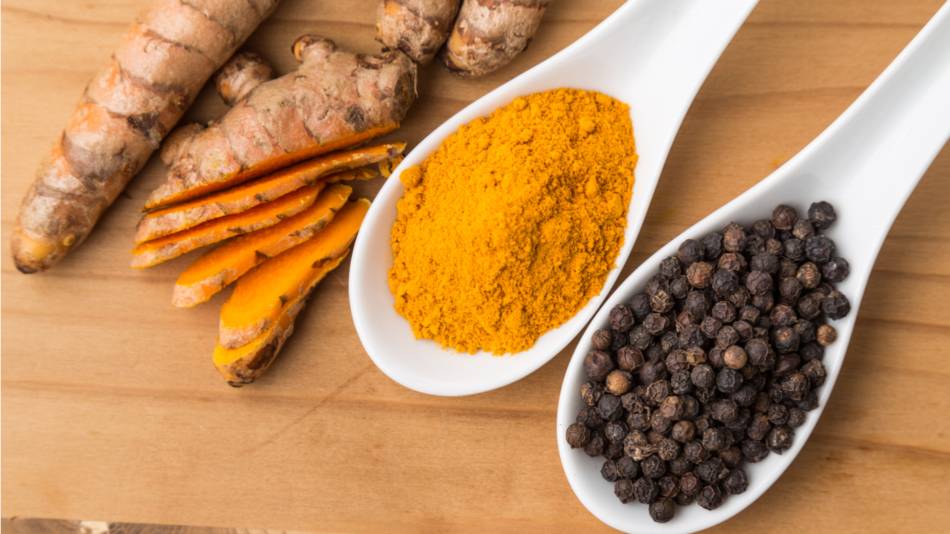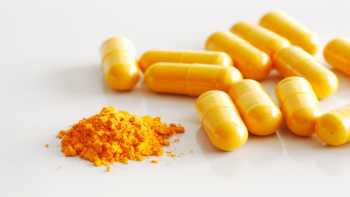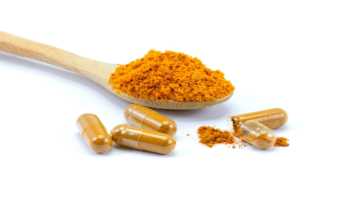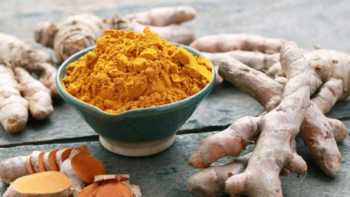Our Members Asked:
Black Pepper Extract & Turmeric: Is black pepper extract necessary for turmeric to be effective, and is it safe?

Answer:
Black pepper is not necessary for turmeric to be absorbed, but it can improve overall bioavailability, which should help with effectiveness.
Black pepper increases bioavailability, not absorption
Black pepper contains a compound, piperine, which inhibits the metabolic breakdown of turmeric compounds in the gut and the liver. This allows higher levels of turmeric compounds to remain in the body, i.e., it increases its bioavailability, which may increase the effects of turmeric.
Black pepper extracts are highly concentrated in piperine and are often added to turmeric/curcumin supplements to increase bioavailability. For example, the patented black pepper extract Bioperine, which is included in many products and sold as a stand-alone supplement, is 95% piperine (FDA GRAS Notification 2013). It is typically added to supplements at a ratio of 2.5 to 5 mg per 500 mg of curcuminoids.
However, the biggest problem with turmeric is making sure that its compounds are absorbed from the gut – and what helps most with this is taking turmeric, or curcumin, with a meal containing fats or oils (typically 15 grams or more) (see How to Take in the Turmeric & Curcumin Supplements Review). Although supplements, such as fish oil, also provide fat, the amount of fat they provide is relatively small (about 1 gram per capsule), so taking such supplements with curcumin probably helps little.
There are also special formulations of turmeric and curcumin supplements that have been developed to make curcumin more soluble for absorption and bioavailability (see Absorption and Bioavailability), but it’s not clear that these formulations are any better than taking regular turmeric or curcumin with a fat-containing meal.
Also see our Turmeric and Curcumin Supplements & Spices Review, which includes our Top Picks among products, including those with piperine and other bioavailability enhancers.
Adding regular black pepper to food
Regular ground pepper is about 2% to 7% piperine, so one-quarter teaspoon of ground black pepper (about 500 mg), contains about 10 to 35 mg of piperine (Gorgani, Compr Rev Food Sci Food Saf 2016).
In people, it has been shown that giving roughly this amount of piperine (20 mg) along with 2,000 mg of curcumin from turmeric gives an enormous 20X boost to the bioavailability of curcuminoid compounds -- which are not normally very bioavailable (Shoba, Planta Med 1998).
What this all means is that adding regular, ground black pepper to a food seasoned with turmeric will very likely increase bioavailability of the curcumin in the turmeric. For example, if you added one teaspoon (about 4 grams) of turmeric powder (spice) to your food, it would contain up to about 120 mg of curcuminoids. Adding one-quarter teaspoon of black pepper to the dish would provide more than enough piperine to greatly increase the bioavailability of this amount of curcuminoids.
Keep in mind, though, that the amount of curcuminoids in foods spiced with turmeric is still much lower than in curcumin supplements (typically 300 to 500 mg per capsule), and be aware that some curcumin may be lost due to heat and chemical changes when cooking foods. And, while piperine increases the bioavailability of curcumin, you should still consume turmeric with fats or oils to improve absorption of these compounds, and do the same when taking turmeric or curcumin from a supplement.
Safety and side effects of piperine
Piperine in black pepper not only slows the breakdown of curcumin but can also slow the breakdown of CoQ10 as well as many medications, including certain NSAIDs, and the anti-seizure and nerve pain drug carbamazepine (Tegretol, Carbatrol, Epitol). This will increase the bioavailability of these agents and their levels in the body, which can be problematic.
In addition, at higher-than-suggested doses, piperine may cause gastrointestinal side-effects and, potentially, bleeding due to an antiplatelet effect. For more details, see the Concerns and Cautions — Black Pepper Extract section of our Turmeric/Curcumin Supplements Review.
Join today to unlock all member benefits including full access to all CL Answers and over 1,400 reviews.
Join NowAlready a member? Sign In Here.
Join now at www.consumerlab.com/join/











Submit your comment
This feature is restricted to active members.
Join now to add comments and get all member benefits, including over 1,400 reviews.
Join NowAlready a member? Sign in here.